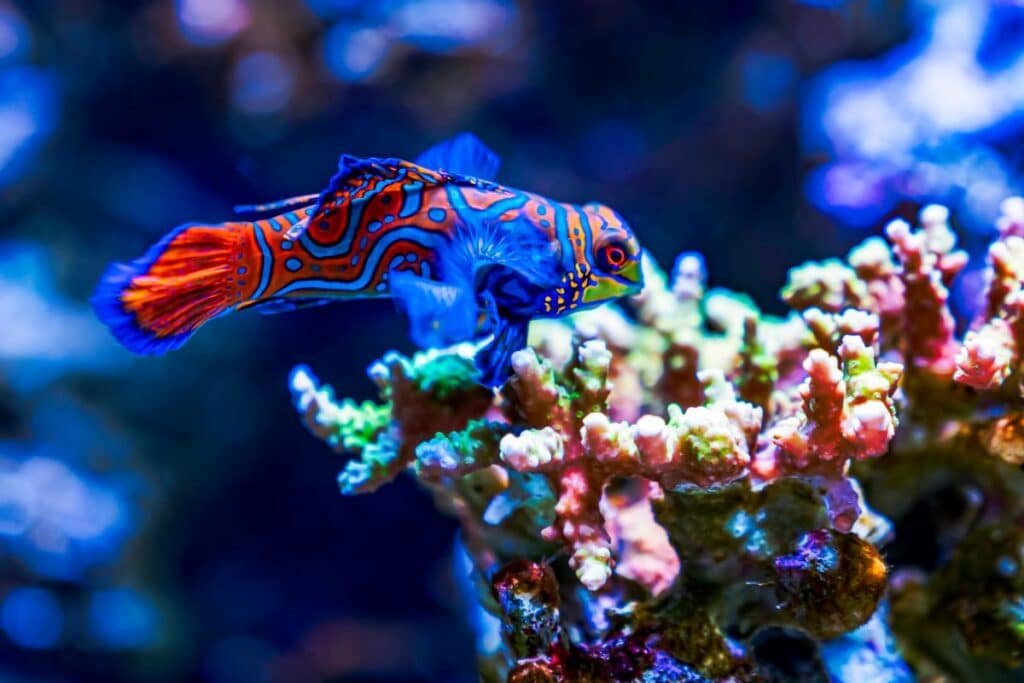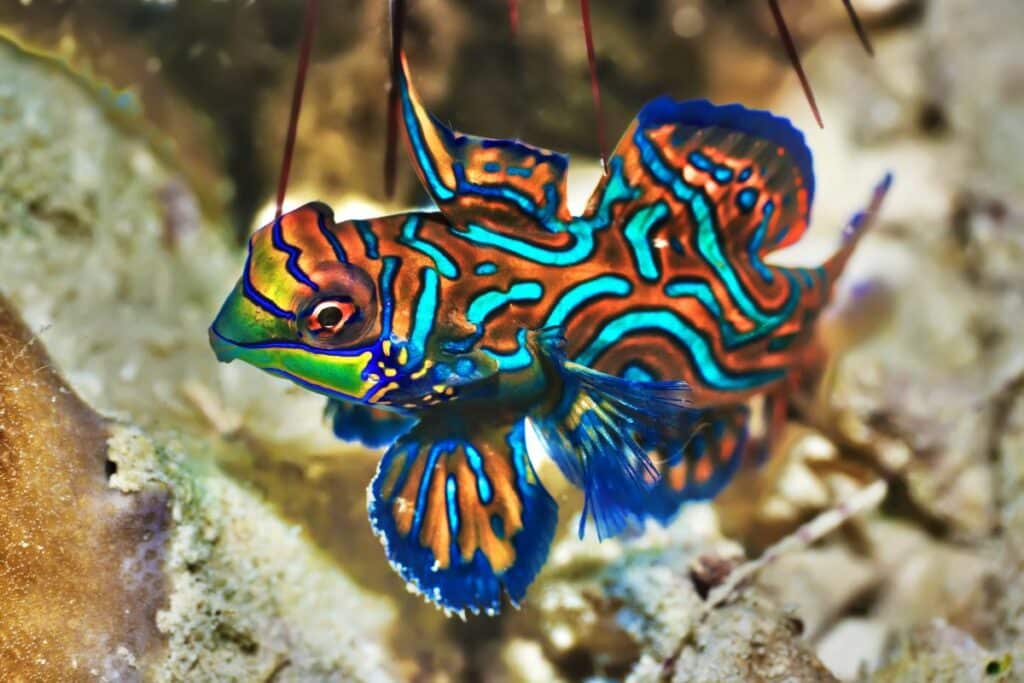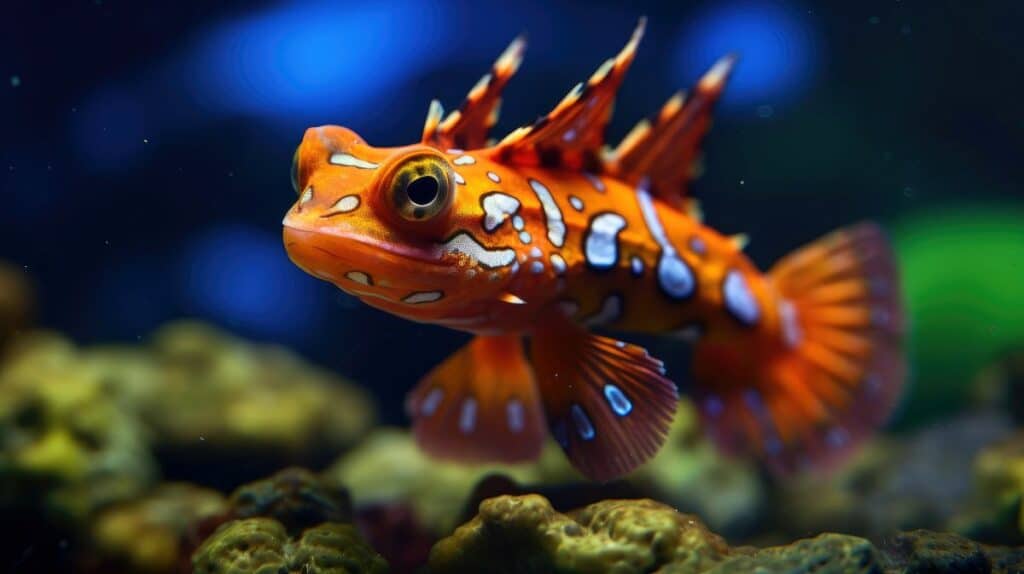the essentials in brief
Mandarinfish are not strong swimmers and prefer shallow waters with plenty of hiding places. An aquarium with a capacity of at least 100 liters is often recommended. Learn more here.
A mandarin fish has an average lifespan of around 3 to 5 years in the wild. In some cases, however, they can live longer. You can find out more about the life expectancy of mandarin fish here.
The Mandarinfish is native to the warm, shallow waters of the tropical Indo-Pacific. It is mainly found in the marine regions of Indonesia and the Philippines. Find out more special features here.
The marine world is filled with an almost endless variety of fascinating creatures and one of these breathtaking creatures that makes the hearts of divers and aquarium enthusiasts beat faster is the Mandarin Fish.
With his breathtaking colourfulness and its unique behavior, the Mandarinfish is undoubtedly a jewel of the underwater world.
A masterpiece of colour

Known scientifically as Synchiropus splendidus, the mandarin fish is famous for its bright and ornate exterior. His body is of one incredible pattern covered in bright shades of blue, orange, green and pink that make it a true wonder of colour.
These vibrant colors not only serve the purpose of aesthetic appeal, but also have one important ecological function.
key fact box
Male Mandarinfish often have longer and more pronounced dorsal fins compared to females. These differences in fin shape can help distinguish the sexes.
Species diversity of mandarin fish
The mandarin fish belongs to Dragonfish family (Callionymidae) and is one of many species in this family. Other related species of dragonfish also exhibit intriguing colors and behaviors.
In addition to the most well-known Synchiropus splendidus (mandarin fish), there are other species of dragonfish that share similar behaviors and colors, including the Ruby Red Dragonet (Synchiropus sycorax) and the Psychedelic Mandarinfish (Synchiropus picturatus).
Diet of the mandarin fish
What makes the mandarin fish particularly fascinating is its feeding habit. Unlike many other fish species, it does not feed on plankton or other small organisms, but of tiny crustaceans and invertebrates.
This food spectrum makes it an important part of the reef as it helps maintaining balance in the ecosystem.
Additional information: Mandarinfish are oviparous and lay eggs that are deposited in sheltered hiding spots such as coral or rock. The eggs are not cared for by the parents and hatch after a few days.
The demanding habitat
The Mandarinfish is native to the warm, shallow waters of the tropical Indo-Pacific. It is mainly found in the marine regions of Indonesia, the Philippines, Malaysia, Australia, Papua New Guinea and the Solomon Islands. These regions include parts of the western and central Pacific as well as the Indian Ocean.
The preferred habitat of the mandarin fish are Coral reefs and sheltered lagoons. They are often found in shallow waters near reef structures, nesting among the coral, rock formations, and other hiding places.
These hiding places are of great importance for the mandarin fish, as it is a slow swimmer and must protect himself from possible predators.
The colorful splendor of the coral reef not only provides shelter for the mandarin fish, but one too rich food source.
posture challenges
Because of their breathtaking beauty, mandarin fish are often kept by aquarium enthusiasts. However, keeping these fish in aquariums is a problem big challenge period.
Their special dietary needs and delicate nature require one well-established and balanced ecosystem in the aquarium to ensure they can find sufficient food.
Protective measures for the mandarin fish
With the threats to coral reefs and marine life in general, protection of the Mandarinfish is of great importance.
The preservation of its natural habitats and promoting sustainable practices are crucial to ensure future generations have the opportunity to admire these stunning creatures in all their glory.
Amount of water required

The amount of water needed for a mandarin fish depends on various factors including the size of the aquarium, the water quality, the number of housemates and the availability of food.
Since mandarin fish have specific requirements for their environment, proper aquarium design is vital to ensure they meet their needs enough food find and lead a healthy life.
Mandarinfish are not strong swimmers and prefer shallow waters with plenty of hiding places. An aquarium with a Capacity of at least 100 liters (26 gallons) is often recommended to give them adequate space and hiding places.
However, a larger aquarium can be beneficial as it can facilitate stability of water parameters and better maintain food supply.
In addition to the volume of the aquarium, the Structure and design of the living space important. A well-established reef system or coral garden in the aquarium will provide hiding places for the mandarinfish and help it find its favorite prey items.
The water quality is also of great importance. Stable water parameters such as temperature, salinity (salinity), ammonia and nitrate levels must be regularly monitored and maintained to ensure the mandarinfish's health and welfare.
Tip: The presence of live rocks and hiding places made of coral or rock is advisable.
Life expectancy of the mandarin fish
A Mandarinfish (Synchiropus splendidus) has an average lifespan in the wild from about 3 to 5 years. However, in some cases they can live longer, possibly up to 6 or 7 years if environmental conditions are favourable.
In aquariums can mandarin fish tend to live longer, as they are less exposed to dangers and stressors in a controlled environment than in the wild.
Under optimal conditions that provide a suitable food source and stable water quality, mandarin fish could grow in aquariums up to 10 years or even live longer.
However, the exact life expectancy of a mandarin fish can vary greatly and depends on various factors, including where they come from, the quality of their environment, their diet, and their general health.
Note: Diligent care and the creation of an appropriate habitat are critical to maximizing the lifespan of a mandarinfish, whether living in the wild or in captivity.
The colorful mandarin fish
The mandarin fish is undoubtedly one Jewel of the underwater world. Its vibrant colors, unique behaviors and importance to ecological balance make it a fascinating creature to protect and preserve.
Whether in the wild or in lovingly tended aquariums, the mandarin fish will always amaze people and amaze deep appreciation for the wonders of the oceans wake up.




